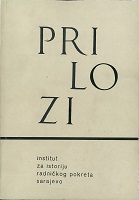OSVRT NA POLITIKU KOMUNISTIČKE PARTIJE U BOSNI I HERCEGOVINI PRED PETU ZEMALJSKU KONFERENCIJU 1940. GODINE
THE POLICY OF THE COMMUNIST PARTY OF YUGOSLAVIA IN BOSNIA AND HERCEGOVINA BEFORE THE FIFTH NATIONAL CONFERENCE OF 1940
Author(s): Nedim ŠaracSubject(s): Regional Geography, WW II and following years (1940 - 1949), History of Communism
Published by: Institut za istoriju
Keywords: 1940; Yugoslavia; communist; crisis;
Summary/Abstract: With the interwoven influence of internal factors and the international situation in the second half of 1939 and over the course of 1940, events in Yugoslavia became exceptionally dynamic and took on the character of social and political turmoil. The identity of the basic course of shifts and regroupings of the working masses within the framework of this turmoil, which are somewhat specific in Bosnia and Hercegovina, with the new course of independent policy of the Communist Party of Yugoslavia (CPY) is confirmed and embodied in a revolutionary-democratic movement of great potential. After considerable oscillation during the previous two decades, the organization of the CPY - including its section in Bosnia and Hercegovina - was then going through a stage of definitive consolidation and began to constitute the most vital anti-fascist political current in the country. Considerably divested of dogmatism, the realistic treatment of the unsolved social problems, as well as the adoption of the view of »people's autonomy« of Bosnia and Hercegovina as part of the complex modernized •revolutionary democratic concepts of the CPY, considerably strengthened the political prestige of the communists, in as much as such an orientation - as the principled negation of the bourgeois nationalist policy - suited the vital interests of the people of this area and of the entire Yugoslav community. The regional party conference of July 27-28, 1940, represents an important event in the development of the CPY in Bosnia and Hercegovina. After thorough preparations, that gathering took place in Sarajevo, in strictest illegality. For nearly 24 hours the 20 delegates from Sarajevo, Tuzla, Banja Luka, Mostar, Zenica and Bugojno critically considered the activities of communists in all fields and, with a great deal of inventiveness, established adequate methods of further revolutionary work under the complex and delicate conditions of the prevailing social processes. The participants of the conference finally unanimously adopted a resolution which in 15 points established the direction of policy and operative tasks of the CPY in Bosnia and Hercegovina and then elected a new regional committee and 5 delegates to represent them in the national conference of the CPY. With its program built and affirmed before the war, the CPY reached the level of a first-class political power completely overshadowing the conformist socialist right and eliminating the previous monopoly of bourgeois elements over the leading positions in national movements. The acquired social power and influence of the Communist Party for all practical purposes debilitated the anti-communist law concerning the protection of the state. Identifying with the most progressive liberation movements in the society, communists were to acquire the mandate of history in the crucial events of 1941 to assume the decisive role in the actual revolutionary disentanglement of the crisis on the Yugoslav soil.
Journal: Prilozi
- Issue Year: 1970
- Issue No: 6
- Page Range: 117-124
- Page Count: 8
- Language: Bosnian

